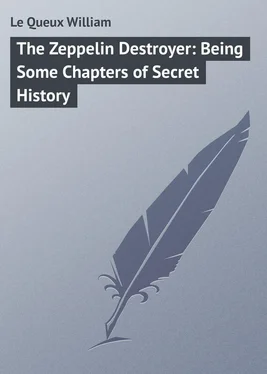William Le Queux - The Zeppelin Destroyer - Being Some Chapters of Secret History
Здесь есть возможность читать онлайн «William Le Queux - The Zeppelin Destroyer - Being Some Chapters of Secret History» — ознакомительный отрывок электронной книги совершенно бесплатно, а после прочтения отрывка купить полную версию. В некоторых случаях можно слушать аудио, скачать через торрент в формате fb2 и присутствует краткое содержание. Жанр: foreign_prose, на английском языке. Описание произведения, (предисловие) а так же отзывы посетителей доступны на портале библиотеки ЛибКат.
- Название:The Zeppelin Destroyer: Being Some Chapters of Secret History
- Автор:
- Жанр:
- Год:неизвестен
- ISBN:нет данных
- Рейтинг книги:3 / 5. Голосов: 1
-
Избранное:Добавить в избранное
- Отзывы:
-
Ваша оценка:
- 60
- 1
- 2
- 3
- 4
- 5
The Zeppelin Destroyer: Being Some Chapters of Secret History: краткое содержание, описание и аннотация
Предлагаем к чтению аннотацию, описание, краткое содержание или предисловие (зависит от того, что написал сам автор книги «The Zeppelin Destroyer: Being Some Chapters of Secret History»). Если вы не нашли необходимую информацию о книге — напишите в комментариях, мы постараемся отыскать её.
The Zeppelin Destroyer: Being Some Chapters of Secret History — читать онлайн ознакомительный отрывок
Ниже представлен текст книги, разбитый по страницам. Система сохранения места последней прочитанной страницы, позволяет с удобством читать онлайн бесплатно книгу «The Zeppelin Destroyer: Being Some Chapters of Secret History», без необходимости каждый раз заново искать на чём Вы остановились. Поставьте закладку, и сможете в любой момент перейти на страницу, на которой закончили чтение.
Интервал:
Закладка:
“No, Sir Herbert,” I replied. “That’s not the point. There are many weaknesses in the aeroplane, which do not exist in the big airship – the cruiser of the air. We are only the butterflies – or perhaps hornets, as the Cabinet Minister once termed us – but I fear we have not yet shown much sting.”
“We may, Claude!” interrupted Roseye with a gay laugh.
“Let’s hope we can,” I said. “But all these new by-laws are, surely, useless. Let’s hit the Hun in his home. That’s my point of view. We can do it – if only we are allowed.”
“I’m quite sure of that, Claude,” Roseye declared. “There are lots of flying-men who, if given bombs to-morrow, would go up and cross to the enemy aircraft centres in Belgium or Schleswig and drop them – even at risk of being shot down.”
“Well, Sir Herbert,” I ventured, laughing, “the situation is not without its humour. I don’t know whether it has ever occurred to you that, in order not to unduly alarm the public, we may yet have certain regulations posted upon our hoardings that may prohibit Zeppelin commanders from cruising over England without licences; that they must have red rear-lights; they must put silencers upon their engines, and must not throw orange peel, paper bags, bottle or other refuse within the meaning of the Act into the streets in such a manner as to cause any danger to foot-passengers or create litter such as would come beneath the powers relegated to inspectors of nuisances of Boroughs. Such regulations might, perhaps, make it a penal offence if Zeppelins did not keep to the left in traffic; if bombs were dropped in places other than those properly and purposely illuminated for the purpose, or if they did not travel at a rate faster than the British aircraft.”
“Really, Claude, that’s an awfully humorous idea,” remarked Sir Herbert as all at table laughed.
“In addition, it might be suggested that the heads of all dogs, ducks, cats, parrots, and the horns of gramophones might be encased in cotton-wool to conceal their whereabouts, that no smoking be permitted, and no artificial light between one hour before sunset and one hour after sunrise.”
“Exactly,” I laughed. “And an inter-departmental committee of the red-tabbed might be charged with the due execution of the regulations – all offenders to be shot at sunrise following the day whereon any breach of the Defence of the Zeppelin Act were committed.”
“Really you’re too bad!” declared Eastwell, laughing heartily as he held his glass poised in his hand.
“Well,” I protested. “Here we’ve had Zeppelins killing people. Surely something must be done! Either regulate the Zeppelin traffic, or else fight them.”
“I’m all for the latter,” declared Roseye.
“So am I,” was my remark.
“And I also,” declared Eastwell. “ But how ? – that’s the question!”
Roseye exchanged glances with me, and I wondered whether he noticed them.
Somehow I had just a faint suspicion that he did, for I detected a curious expression upon his lips – a look such as I had never seen there before.
He made no remark, but busied himself with the excellently-cooked snipe before him.
Fortunately Lionel Eastwell was not aware of our secret – the secret of that brown deal box which we were so rapidly perfecting.
Only on the previous day Roseye had been up in the air with me across Hampstead, Highgate, and out as far as Hatfield and home to the aerodrome, making a further test of the potent but unseen power which we had been able to create, and which must, if further developed, be our strong arm by which to strike a very deadly blow against enemy airships.
“Personally,” declared Sir Herbert, in his bluff, matter-of-fact way, “I think the whole idea of air-defence from below is utterly futile. A gun can never hit with accuracy a moving object so high in the air and in the dark. What target is there?”
“Exactly,” exclaimed Eastwell. “That has always been my argument. I’ve been interested in aviation for years, and I know the enormous difficulties which face the efforts of those who man our anti-aircraft guns. Searchlights and guns I contend are inadequate.”
“They’ve hardly been tried, have they?” queried Lady Lethmere. “And, moreover, I seem to recollect reading that both have done some excellent work on the French front.”
“But London is not the French front,” Eastwell protested. “The conditions are so very different.”
“Then what do you suggest as a really reliable air-defence?” Sir Herbert inquired.
“Fight them with fast aeroplanes and bombs,” Eastwell said.
“But you’ve just told Munro that had he gone up last night from Hendon his flight would have been quite useless, as he would never have been able to mount sufficiently high in the time.”
“Quite so. But we ought to have efficient air-patrols at night,” was his reply.
“Combined with properly illuminated landing-places,” Roseye added. “Otherwise more than half the airmen and observers must kill themselves through landing in the dark without any knowledge of the direction of the wind.”
“That could all be arranged – as it no doubt will be in due course,” I said. “The Government are not such fools as some people seem inclined to believe. I’m not one of those who blame the whole Government for a few mistakes of its subordinate departments, and the incompetency of men pitchforked, in the hurry of an unexpected war, into places for which they are entirely unfitted. We all know of glaring cases of that sort. No. Let’s take heart, and look on the best side of things. Britain is not vanquished yet, and the heart of the true Briton beats quicker and is fiercer than ever in its patriotism over the base enemy outrage of the kind that was committed upon innocent Londoners last night.”
“Only yesterday I was reading a popular book called Can Germany Win ? written by an anonymous American,” remarked Sir Herbert. “The writer gaily informs the public that even well-directed rifle-fire can bring the vaunted Zeppelins down, and to secure any accuracy of aim themselves, the airships must descend to an altitude which brings them well within the range of modern guns.”
“I know!” I laughed. “The rubbish written about Zeppelins is simply ludicrous. I’ve read that book, which has no doubt been read by thousands of patriotic Britons. I remember quite well that, in it, we are gravely informed that as far as Zeppelins were concerned the British public may sleep comfortably in their beds. The great thing is, we are urged, to discount as far as possible, by reason supported by scepticism, the terrorising tales of the Zeppelin’s worth and doughty prowess which are so brilliantly ‘press-agented’ in Germany. The writer has further told us that talk never broke any bones, and the Germans are doing a good deal of talk at the present moment to hide the defects in their monster pets which have been detected as useless by the test of War. The Zeppelins, the writer told us, are comparatively negligible quantities. Last night’s raid is the commentary.”
“Yes,” said Roseye, “something must really be done to prevent such raids.”
“But how?” queried Lionel Eastwell across the table in that slow refined voice of his. “It’s all very well to talk like that – but you must act .”
Roseye and I again exchanged glances. She knew well what was passing in my mind.
And I remained silent.
Chapter Six
Theed’s Strange Story
The following morning while I was writing letters in my room Theed entered, saying that his father had called and wished to see me.
A moment later the sturdy old ex-police-sergeant came in, his felt hat in his hand, and when I had sat him beside the fire I saw an unusual expression upon his grey, furrowed countenance.
Читать дальшеИнтервал:
Закладка:
Похожие книги на «The Zeppelin Destroyer: Being Some Chapters of Secret History»
Представляем Вашему вниманию похожие книги на «The Zeppelin Destroyer: Being Some Chapters of Secret History» списком для выбора. Мы отобрали схожую по названию и смыслу литературу в надежде предоставить читателям больше вариантов отыскать новые, интересные, ещё непрочитанные произведения.
Обсуждение, отзывы о книге «The Zeppelin Destroyer: Being Some Chapters of Secret History» и просто собственные мнения читателей. Оставьте ваши комментарии, напишите, что Вы думаете о произведении, его смысле или главных героях. Укажите что конкретно понравилось, а что нет, и почему Вы так считаете.












